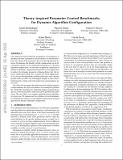Files in this item
Theory-inspired parameter control benchmarks for dynamic algorithm configuration
Item metadata
| dc.contributor.author | Biedenkapp, André | |
| dc.contributor.author | Dang, Nguyen | |
| dc.contributor.author | Krejca, Martin | |
| dc.contributor.author | Hutter, Frank | |
| dc.contributor.author | Doerr, Carola | |
| dc.contributor.editor | Fieldsend, Jonathan E. | |
| dc.date.accessioned | 2023-02-02T11:30:03Z | |
| dc.date.available | 2023-02-02T11:30:03Z | |
| dc.date.issued | 2022-07-08 | |
| dc.identifier | 280770267 | |
| dc.identifier | 6c4e33fc-465b-40d5-8ac9-41e6f26e99fe | |
| dc.identifier | 000847380200088 | |
| dc.identifier | 85131631086 | |
| dc.identifier.citation | Biedenkapp , A , Dang , N , Krejca , M , Hutter , F & Doerr , C 2022 , Theory-inspired parameter control benchmarks for dynamic algorithm configuration . in J E Fieldsend (ed.) , GECCO '22 : Proceedings of the genetic and evolutionary computation conference . ACM , New York, NY , pp. 766–775 , GECCO'22 , Boston, MA , United States , 9/07/22 . https://doi.org/10.1145/3512290.3528846 | en |
| dc.identifier.citation | conference | en |
| dc.identifier.isbn | 9781450392372 | |
| dc.identifier.other | ORCID: /0000-0002-2693-6953/work/117211368 | |
| dc.identifier.uri | https://hdl.handle.net/10023/26886 | |
| dc.description | Funding: Nguyen Dang is a Leverhulme Early Career Fellow. This project has received funding from the European Union’s Horizon 2020 research and innovation program under the Marie Skłodowska-Curie grant agreement No. 945298-ParisRegion-FP. It is also supported by the Paris Île-de-France region, via the DIM RFSI AlgoSelect project and is partially supported by TAILOR, a project funded by EU Horizon 2020 research and innovation programme under GA No 952215. | en |
| dc.description.abstract | It has long been observed that the performance of evolutionary algorithms and other randomized search heuristics can benefit from a non-static choice of the parameters that steer their optimization behavior. Mechanisms that identify suitable configurations on the fly ("parameter control") or via a dedicated training process ("dynamic algorithm configuration") are thus an important component of modern evolutionary computation frameworks. Several approaches to address the dynamic parameter setting problem exist, but we barely understand which ones to prefer for which applications. As in classical benchmarking, problem collections with a known ground truth can offer very meaningful insights in this context. Unfortunately, settings with well-understood control policies are very rare. One of the few exceptions for which we know which parameter settings minimize the expected runtime is the LeadingOnes problem. We extend this benchmark by analyzing optimal control policies that can select the parameters only from a given portfolio of possible values. This also allows us to compute optimal parameter portfolios of a given size. We demonstrate the usefulness of our benchmarks by analyzing the behavior of the DDQN reinforcement learning approach for dynamic algorithm configuration. | |
| dc.format.extent | 10 | |
| dc.format.extent | 1210824 | |
| dc.language.iso | eng | |
| dc.publisher | ACM | |
| dc.relation.ispartof | GECCO '22 | en |
| dc.subject | QA75 Electronic computers. Computer science | en |
| dc.subject | NS | en |
| dc.subject | MCC | en |
| dc.subject | NIS | en |
| dc.subject.lcc | QA75 | en |
| dc.title | Theory-inspired parameter control benchmarks for dynamic algorithm configuration | en |
| dc.type | Conference item | en |
| dc.contributor.sponsor | The Leverhulme Trust | en |
| dc.contributor.institution | University of St Andrews. School of Computer Science | en |
| dc.contributor.institution | University of St Andrews. Centre for Interdisciplinary Research in Computational Algebra | en |
| dc.identifier.doi | 10.1145/3512290.3528846 | |
| dc.identifier.url | https://dl.acm.org/doi/proceedings/10.1145/3512290 | en |
| dc.identifier.url | https://arxiv.org/abs/2202.03259 | en |
| dc.identifier.grantnumber | ECF-2020-168 | en |
This item appears in the following Collection(s)
Items in the St Andrews Research Repository are protected by copyright, with all rights reserved, unless otherwise indicated.

